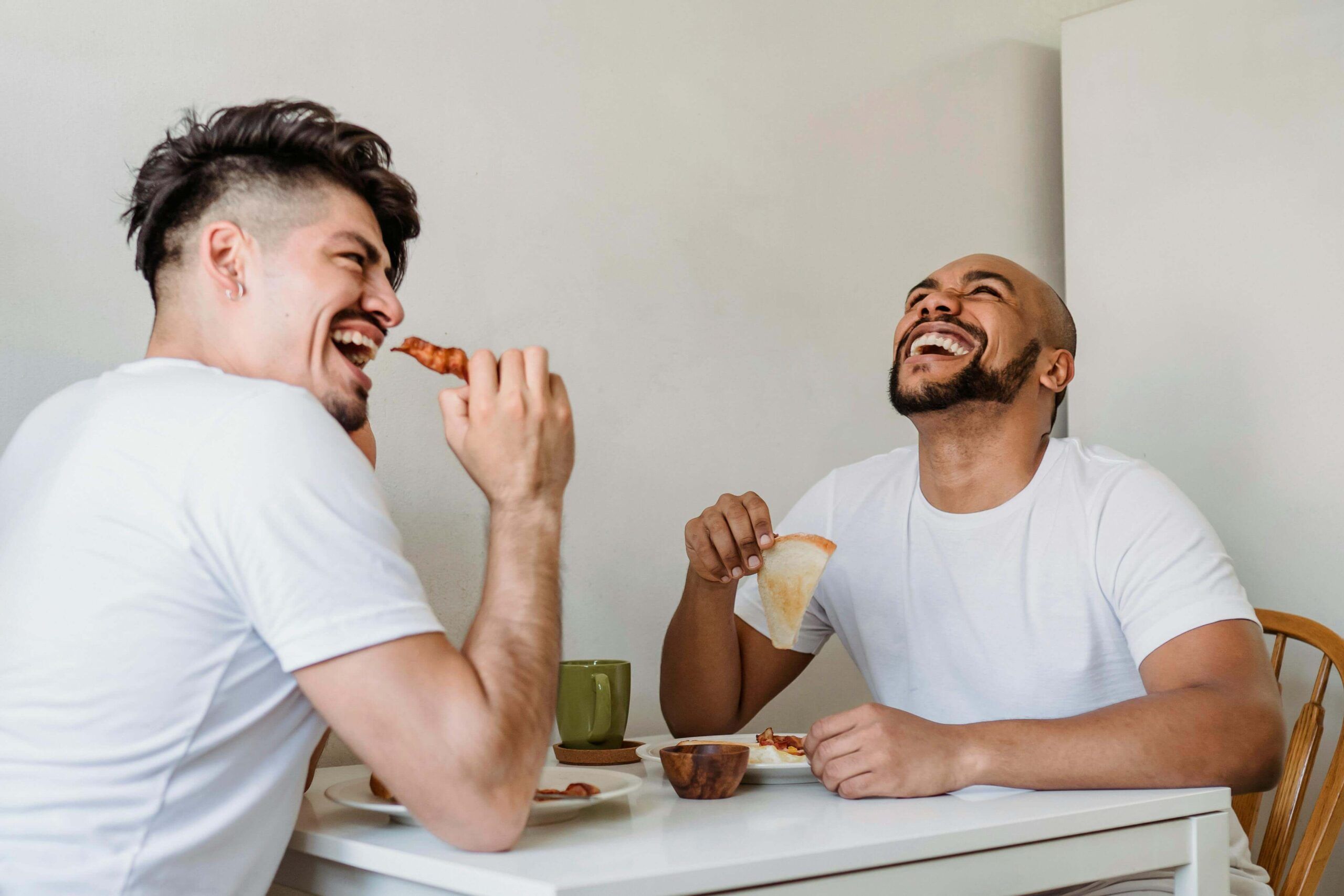How Nutrition Counseling Supports Kids with ARFID Without Shame or Pressure to ‘Just Try It’
You’ve heard it a hundred times: “They’ll eat when they’re hungry enough.” But when you watch your child push away plate after plate, anxiety tightening in your chest, you know it’s not that simple. Maybe mealtimes have become a battleground of tears and bargaining. Perhaps you’ve tried every trick: reward charts, hiding vegetables, and the “one-bite rule, only to see your child’s distress deepen. If you’re feeling exhausted, worried, and desperately alone in this struggle, please know you are not failing as a parent and that nutrition counseling in Raleigh, NC can help.
Your child isn’t being difficult or stubborn. They may be navigating something called ARFID, and nutrition counseling at Nutritious Thoughts offers a completely different path forward. One without force-feeding, bribes, or the pressure to “just try it.” This approach isn’t about making your child eat everything on their plate. It’s about reducing mealtime stress, honoring their unique nervous system, and helping your whole family find peace at the table again.
When “Just Try It” Doesn’t Work: What ARFID Really Is
ARFID stands for Avoidant/Restrictive Food Intake Disorder, but that clinical term doesn’t capture what it actually feels like to live with. This isn’t about picky eating or trying to lose weight. It’s not a phase your child will simply outgrow with enough exposure. ARFID is rooted in how your child’s brain and body respond to food, often tied to sensory sensitivities, a genuine fear of eating consequences, or a lack of natural interest in food altogether. ARFID can show up in three main ways, and your child might experience one or a combination of these. Some kids have sensory-based ARFID, where the texture of yogurt triggers immediate gagging, or certain food colors feel fundamentally “wrong” to their nervous system. It’s not dramatic or attention-seeking; their body genuinely perceives these foods as unsafe.
Other children experience fear-based ARFID, where one negative experience (choking, vomiting, or even watching someone else get sick) creates lasting panic around new foods or eating in general. Then there are kids with low appetite-driven ARFID, who simply aren’t interested in food. They forget to eat, don’t experience hunger cues clearly, and eating feels like a chore rather than a pleasure. Maybe you’ve been told by well-meaning doctors that your child will outgrow this, or that you just need to try exposure therapy. Perhaps nutritionists have handed you meal plans that felt impossible to implement without traumatizing your child. If that resonates, please hear this: we have a team of registered dietitians in Raleigh, NC, who truly understand ARFID knows this isn’t a behavioral problem you can discipline away. This is neurological, and this is sensory. And it requires a completely different approach.
The Hidden Cost of Pressure at the Table
Let’s talk about what happens when we try to push through ARFID with traditional strategies. The “one-bite rule” might work for some kids, but for a child with ARFID, it can create genuine food trauma. Their nervous system registers that bite as a threat, and the dinner table becomes a place of fear rather than nourishment. Reward systems, “If you eat your vegetables, you can have dessert”, teach children not to trust their own hunger and fullness signals. They learn that some foods are “good” and others are “bad,” and that their body’s responses can’t be trusted. When we compare them to siblings who eat everything, we reinforce shame. Your child already feels different. They don’t need more evidence that something is wrong with them.
Here’s what’s happening beneath the surface: when your child feels pressured to eat, their body shifts into fight-or-flight mode. Stress hormones flood their system. Digestion actually shuts down, making eating feel even more uncomfortable. Anxiety around food increases, not decreases. The dinner table, which should be a place of connection and safety, becomes a battleground. And you, trying desperately to nourish your child, become the enemy in their mind. If you’ve tried everything and feel desperate, that’s completely understandable. You love your child fiercely and want them to be healthy. But here’s the truth: nutrition counseling for well-being takes a fundamentally different approach. One that respects your child’s nervous system and builds trust instead of breaking it down.
Building Trust, Not Forcing Bites: The ARFID-Informed Approach
Compassionate nutrition counseling for ARFID starts with a core principle: no pressure. This might sound counterintuitive when your child barely eats, but pressure is what’s keeping them stuck. We adapt the Division of Responsibility in feeding specifically for ARFID. As the parent, you provide safe foods that your child already accepts. You can also make new foods available for exposure, sometimes right on their plate in very small quantities, without any expectation that they’ll be eaten. Your child decides whether to eat and how much. This immediately removes the power struggle that’s been exhausting your entire family. For a child with ARFID, simply tolerating a new food across the room can be a significant step.
From there, we might work toward having it on the table. Then touching it with a utensil, and then with a finger. Smelling it. Licking it. Spitting it out. Every single one of these steps is valid progress. We call this “food play,” not “food exposure,” because play implies safety, curiosity, and no wrong answers. A registered dietitian in Raleigh, NC, who specializes in ARFID will spend time understanding the “why” behind your child’s fear or avoidance. Maybe it’s the unpredictability of mixed textures in casseroles. Perhaps it’s a specific smell that triggers past nausea. It could be the social pressure of being watched while they eat. When we understand the root, we can work around it with compassion.
One Powerful Strategy is Called Food Chaining.
We start with foods your child already accepts and make tiny, almost imperceptible modifications. If your child eats one specific brand of chicken nuggets, we might try the same brand in a different shape. Then a different brand, and then homemade nuggets that look similar. Eventually, plain chicken strips. Each step builds a bridge from safe to new, but we only move forward when your child’s nervous system signals readiness.
Throughout this process, we ensure nutritional safety. Even with limited variety, we can make sure your child gets adequate calories and essential nutrients. Sometimes that means supplements, presented without shame or pressure. We monitor growth without making weight the focus of every conversation. Your child’s well-being encompasses so much more than numbers on a scale or chart.
Inside a Session: What You and Your Child Can Expect
 Walking into nutrition counseling in Raleigh, NC, for ARFID looks different than a typical nutrition appointment. The initial session and assessment aren’t about judging your child’s limited food list. It’s about mapping their safe foods with curiosity and respect. We want to understand your child’s complete sensory profile: What textures feel tolerable? Are certain colors more acceptable than others? What temperatures do they enjoy? We’ll discuss what makes mealtimes stressful at home and at school. Most importantly, we’ll listen to your child’s fears in their own words, validating their experience rather than dismissing it.
Walking into nutrition counseling in Raleigh, NC, for ARFID looks different than a typical nutrition appointment. The initial session and assessment aren’t about judging your child’s limited food list. It’s about mapping their safe foods with curiosity and respect. We want to understand your child’s complete sensory profile: What textures feel tolerable? Are certain colors more acceptable than others? What temperatures do they enjoy? We’ll discuss what makes mealtimes stressful at home and at school. Most importantly, we’ll listen to your child’s fears in their own words, validating their experience rather than dismissing it.
From there, we work together to create a sensory-friendly food environment. This might mean practical changes like serving all foods separately so textures don’t touch. Using the same plates and utensils every time to reduce variables. Minimizing visual and auditory distractions during meals so your child can focus on their body’s signals. We’ll even develop “exit strategies” for when overwhelm happens, because sometimes the kindest thing we can do is let a child step away and regulate before trying again.
Parent Coaching is a Crucial Part of This Work.
You’ll learn how to use neutral language around food. Instead of “You’ll love this!” or “Just try it,” we practice saying, “This is chicken” with no emotional charge. We’ll talk through how to respond when relatives make comments about your child’s eating, and how to manage your own anxiety at mealtimes. Kids are incredibly perceptive; they pick up on our stress. We might even role-play challenging scenarios, like navigating school lunch or birthday parties, so you feel equipped to advocate for your child.
Nutrition counseling for well-being often works best as part of a larger team. Your registered dietitian can collaborate with occupational therapists and mental health professionals to address sensory processing and anxiety. They also work closely with pediatricians to monitor your child’s growth. When everyone is aligned in a pressure-free, compassionate approach, your child feels that safety across all their care.
Redefining Progress: What True Healing Looks Like
Here’s where we need to shift our definition of success. Progress isn’t measured solely by the number of new foods your child eats. It’s measured by the quality of their relationship with food and with mealtimes. Can your child sit at the table without tears? That’s progress. Can they be in the same room as new foods without panic? That’s growth. If they try a tiny taste without being asked, that’s a massive win worth celebrating. When they can verbalize their needs, “That’s too crunchy for me today”, they’re building self-awareness and trust in their body’s signals. Nutritional stability absolutely matters. Your child growing appropriately for their unique body matters deeply. Stable energy levels throughout the day are important markers of well-being. Ensuring they’re not nutrient-deficient, even if their variety remains limited, is part of our commitment to their health.
But these markers exist alongside emotional and relational wins. Has your child’s anxiety around food decreased? Has your relationship with them improved now that meals aren’t a constant conflict? Are they willing to be curious about food, even if they don’t eat it? These changes matter deeply. And let’s talk about something we don’t discuss enough: your relief as a parent is valid progress too. When you feel less stressed about meals, when you can trust this process instead of forcing, when you see your child as a whole person rather than just their eating challenges—that transformation is real and important. Nutrition counseling for well-being recognizes that when the whole family system relaxes, healing accelerates.
You Don’t Have to Navigate This Alone
Supporting a child with ARFID is a marathon, not a sprint. There will be weeks of progress followed by setbacks that feel discouraging. There might be grief in recognizing that family meals don’t look like you imagined they would. All of these feelings are valid, and you deserve compassion for navigating something genuinely difficult. Right now, even before seeking professional support, there are small shifts you can make. Try stopping all comments about what or how much your child eats. Practice neutral observation only. Make sure every meal includes at least one safe food so your child has something they can eat without stress.
is a marathon, not a sprint. There will be weeks of progress followed by setbacks that feel discouraging. There might be grief in recognizing that family meals don’t look like you imagined they would. All of these feelings are valid, and you deserve compassion for navigating something genuinely difficult. Right now, even before seeking professional support, there are small shifts you can make. Try stopping all comments about what or how much your child eats. Practice neutral observation only. Make sure every meal includes at least one safe food so your child has something they can eat without stress.
Let them see you enjoying new foods without any pressure for them to try. These might feel like tiny steps, but they signal safety to your child’s nervous system. You might be wondering when it’s time to reach out to a registered dietitian in Raleigh, NC. Consider professional support if your child’s limited variety is affecting their growth or if mealtimes are causing significant family distress. Social situations like school lunches or birthday parties may also become traumatic. If you need more tools than you can manage on your own, reaching out for help can make a difference. Asking for help isn’t a sign of failure. It’s a sign of wisdom and love.
Overwhelmed by ARFID Mealtimes? Nutrition Counseling in Raleigh, NC, Can Help Your Family Find Peace
You might feel like every meal is a battle, and you’re not alone in this struggle. When your child has ARFID, the constant worry about nutrition, growth, and their relationship with food can feel overwhelming. At Nutritious Thoughts, we understand how exhausting and isolating this journey can be, and we’re here to help. Our compassionate team provides personalized nutrition counseling in Raleigh, NC, offering specialized support to help your family navigate ARFID with confidence and clarity.
A registered dietitian who truly understands sensory processing and neurodiversity can make all the difference. Whether in-person at our offices in Raleigh, Hendersonville, and Asheville, or through virtual sessions across North Carolina, we’re committed to providing gentle, non-judgmental guidance tailored to your child’s unique needs. Let us help you and your child rebuild trust around food and mealtimes as you move forward. Together, we’ll create a sustainable plan that supports your child’s well-being and brings calm back to your family table.
- Contact us at (828) 333-0096 or email info@nutritious-thoughts.com
- Share your child’s story with us.
- Supporting your child with ARFID is an act of profound love, and we’re here to walk alongside you every step of the way.
Expanded Counseling Services at Nutritious Thoughts
At Nutritious Thoughts, we understand that supporting a child with ARFID requires more than just individual counseling; it’s about creating a supportive environment that empowers lasting change for your whole family. That’s why our services extend beyond traditional one-on-one sessions. Through our Tailored Nutrition Programs, we partner with local schools, community centers, and organizations to offer group workshops, educational presentations, and supportive resources designed specifically for families navigating feeding challenges like ARFID.
Each program is thoughtfully crafted to address the unique needs of every family, blending practical tools with compassionate guidance to help parents and children build a more trusting, positive relationship with food. Our nutrition counseling for well-being approach recognizes that when families feel supported and understood, meaningful change becomes possible. These programs are available both in-person and virtually, ensuring accessibility no matter your location. Our goal is to equip you with the knowledge and strategies to reduce mealtime stress and support your child’s growth with confidence and clarity.



 Understanding PCOS Beyond the Surface
Understanding PCOS Beyond the Surface Move for Joy
Move for Joy Redefining Success on Your Own Terms
Redefining Success on Your Own Terms
 Constant Food Thoughts: What’s Really Going On?
Constant Food Thoughts: What’s Really Going On?



 Scripts & Strategies for Handling Food and Body Comments
Scripts & Strategies for Handling Food and Body Comments This Work Goes Beyond One BBQ or Beach Day
This Work Goes Beyond One BBQ or Beach Day
 Body Trust Doesn’t Disappear Overnight—So Why Do We Expect It to Come Back Instantly?
Body Trust Doesn’t Disappear Overnight—So Why Do We Expect It to Come Back Instantly? What Might Rebuilding Body Trust Actually Look Like—And What If It’s Simpler Than You Think?
What Might Rebuilding Body Trust Actually Look Like—And What If It’s Simpler Than You Think? This Is Not About “Fixing”—It’s About Returning
This Is Not About “Fixing”—It’s About Returning
 Why Intuitive Eating Feels So Hard (And Why You’re Not Doing It Wrong)
Why Intuitive Eating Feels So Hard (And Why You’re Not Doing It Wrong)
 You’re Allowed to Want Something Different
You’re Allowed to Want Something Different
 Why Intuitive Eating Feels So Hard (And Why That Makes Sense)
Why Intuitive Eating Feels So Hard (And Why That Makes Sense) How a Registered Dietitian Supports Intuitive Eating Without Rules
How a Registered Dietitian Supports Intuitive Eating Without Rules What You Won’t Be Told to Do
What You Won’t Be Told to Do